I used to hear words like “exegesis” and think the person speaking such words sounded extra smart. Deeply theological. Something I was not. I just studied the Bible because I loved it—loved sifting through the stories and digging apart words to find the hidden treasures God had waiting for me.
After I went to seminary and learned what exegesis means, I realized it’s not some lofty concept that only seminary students and pastors get to understand or experience. Anyone who studies the Bible should be doing it. The word “exegesis” might sound fancy, but its meaning is simple—and the act of doing it is paramount for understanding the Word of God by which followers of Jesus live and breathe.
Read the article below, or skip to one of the sections below:
- What is exegesis?
- What is the difference between exegesis and eisegesis?
- What is the difference between exegesis and hermeneutics?
- Is exegesis biblical?
- 8 steps of exegesis
- Where to start doing exegesis
- Why do exegesis
- More resources for exegesis
What is exegesis?
Exegesis definition: Exegesis is “the process of careful analytical study of the Bible to produce useful interpretations of those passages.”1 (The word “exegesis” comes from the Greek term ἐξηγέομαι (exegeomai), which means “to explain” or “to narrate” or “to show the way”)
The process of exegesis involves asking questions of the text that might unearth new insights. However, The Anchor Yale Bible Dictionary is clear that the goal of exegesis is “to know neither less nor more than the information actually contained in the passage. Exegesis … places no premium on speculation or inventiveness” and “novelty in interpretation is not prized.”2
Simply put, exegesis is not about discovering what we think a text means (or want it to mean) but what the biblical author meant. It’s concerned with intentionality—what the author intended his original readers to understand.3
In his course New Testament Exegesis: Understanding and Applying the Old Testament, Andy Naselli nicely explains:
Exegesis interprets a text by analyzing what the author intended to communicate. … For example, when a young lady who is deeply in love with her fiancé receives a letter from him, she reads it carefully. She wants to understand what her fiancé meant. The text means what the text’s author meant.4
His point? Good exegesis involves reading God’s Word like that woman read her letter—scrupulously and with the right intent.
What is the difference between exegesis and eisegesis?
It can be tempting to slide into what’s called “eisegesis” when trying to interpret Scripture. (Yeah, I just tossed out another word-that-sounds-theological-but-is-really-not.) Exegesis and eisegesis sound similarly, but the words themselves give a clue to the difference—namely, in the prefixes “ex-” and “eis-.”
“Ex-” means to take out of, while “eis-” means “into.” So quite simply, exegesis means digging into the text to pull out the meaning, while its opposite, eisegesis, reads meaning into a text that isn’t there. Students of the Bible must perform solid exegesis, not eisegesis, because, as Peter J. Leithart says, “We don’t want to twist Scripture into saying something that it doesn’t actually say.”5
We might not always like what the Bible says, but we must resist trying to “explain away anything [we] don’t like as ‘culture bound’ or in some way irrelevant to modern society,”6 as Henry Blackaby warns. Proper exegesis requires guarding against taking verses or passages out of context or doing irresponsible word studies that lead to misleading conclusions to fit what we want Scripture to mean.
Remember, we’re searching for what the author intended for it to mean.
What is the difference between exegesis and hermeneutics?
Though they might seem similar, there’s a slight difference between exegesis and hermeneutics. Hermeneutics focuses on principles of interpretation—how the interpretive process works, the “rules” necessary for searching out meaning. Exegesis applies those principles.
Walter C. Kaiser Jr. explains that hermeneutics may be regarded as “the theory that guides exegesis; exegesis may be understood … to be the practice of and the set of procedures for discovering the author’s intended meaning.”7
Is exegesis biblical?
The word “exegesis” does not appear in the New Testament, but the verb exageomai, “to lead out of,” does (once each in Luke and John and four times in Acts). Alan Cairns in Dictionary of Theological Terms affirms a good handful of folks in the Bible actually did exegesis:
The disciples who met the risen Christ on the road to Emmaus exegeted the events to the other disciples (Luke 24:35). Cornelius exegeted his vision to the servants whom he sent to Peter (Acts 10:8). Paul and Barnabas exegeted to the Jerusalem council the significance of the miracles and wonders God had done through them among the gentiles (Acts 15:12). Peter exegeted to the same gathering God’s first outreach to the gentiles through his ministry (Acts 15:14). Finally, Paul exegeted to James and the Jerusalem elders “particularly,” that is, in detail, what God had done through him among the gentiles (Acts 21:19).8
Now let’s lean in to 2 Timothy 2:15 to further evaluate whether exegesis is biblical:
Study to shew thyself approved unto God, a workman that needeth not to be ashamed, rightly dividing the word of truth. (KJV, emphasis added)
It’s the tail end of that verse, “rightly dividing the word of truth,” that convicts me. According to Paul, I have work to do. And so do you, dear believer. And we are to do that work well so as to not be ashamed. The work? “Dividing”—or in the ESV “handling”—God’s Word “rightly.”
Paul’s word choice “dividing” in 2 Timothy 2:15 was deliberate—it’s orthotomeō in Greek, which means “to cut straight.” It echoes the imagery used of the Word of God as a “double-edged sword” in Hebrews 4:12, a sword Charles Spurgeon says is “not to be played with”:
Swords are meant to cut and hack, and wound, and kill with, and the word of truth is for pricking men in the heart and killing their sins. The word of God is not committed to God’s ministers to amuse men with its glitter, nor to charm them with the jewels in its hilt, but to conquer their souls for Jesus.9
One biblical hero who exemplified handling God’s word rightly is Ezra in 7:10:
For Ezra had set his heart to study the Law of the LORD, and to do it and to teach his statutes and rules in Israel. (Ezra 7:10, emphasis added)
In Old Testament Exegesis: Understanding and Applying the Old Testament, DeRouchie notes there’s an order present:
- Study the word.
- Do [practice] the word.
- Teach the word.
“Before you teach the word to others, you need to practice it,” DeRouchie says. “You must practice what you teach and preach. But before you practice and teach the word, you have to know what it says. So you must study it. You must exegete it.”
So must we. We must responsibly and rightly divide God’s Word so that we can discover what the author intended for us to understand, then apply it to our lives, and then teach it to others.
Exegesis is not only biblical—it’s something we are charged to do.
So the next question is, how?
8 steps of exegesis
It’s nearly impossible to break down exactly how to do proper exegesis (theologians tend to have their own methods), but Naselli offers these 8 steps as one way to approach the process:
1. Genre
Determine the passage’s style of literature. Is it poetry? Historical narrative? An epistle?
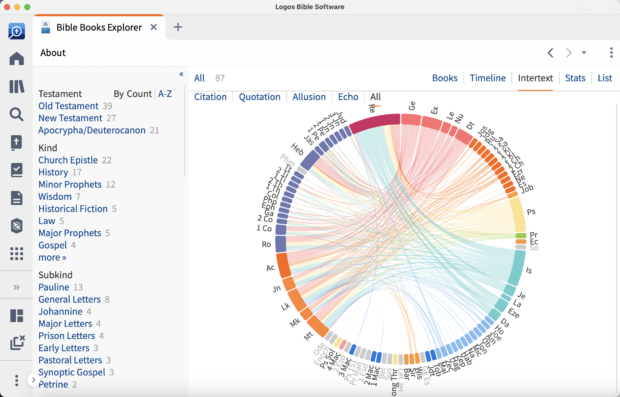
2. Textual criticism
Study the manuscript evidence to determine the original text’s exact wording.
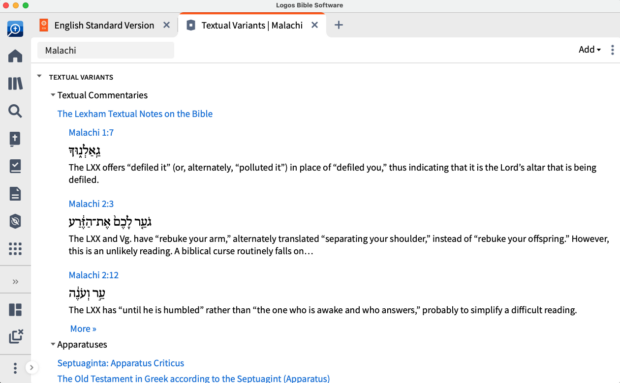
3. Translation
Translate the original language and compare other translations. (This is where a good Bible app comes in handy, especially if you do not know biblical Hebrew or Greek. More on that below.)
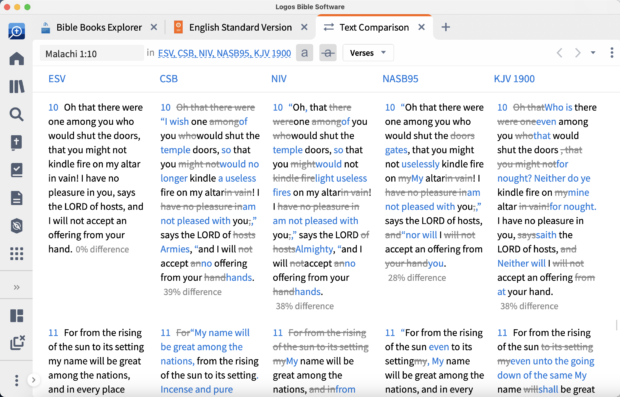
4. Greek and Hebrew grammar
Consider how sentences communicate by looking into their original language—words, phrases, and clauses.
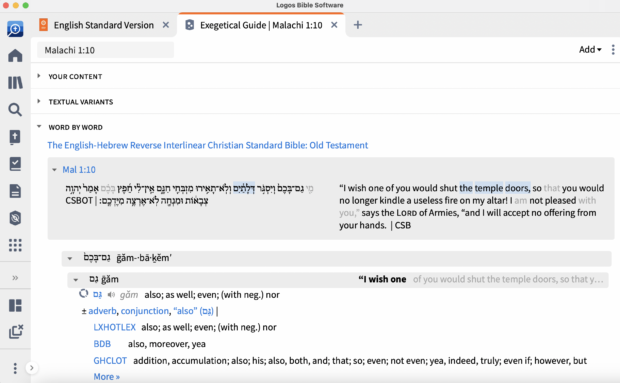
5. Argument diagram
Trace the author’s logical argument by arcing, bracketing, or phrasing.
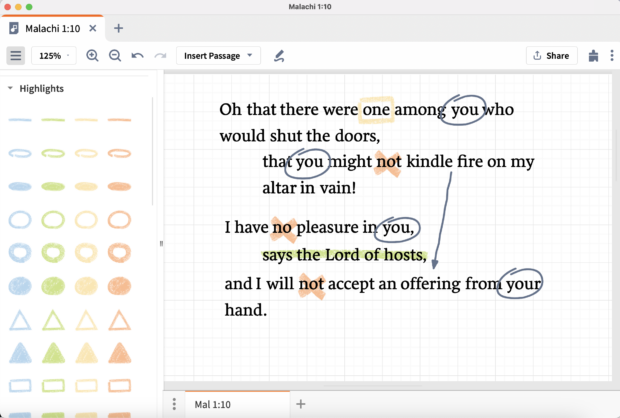
6. Historical-cultural context
Understand the situation in which the author composed the literature and any historical-cultural details that the author mentions or probably assumes.
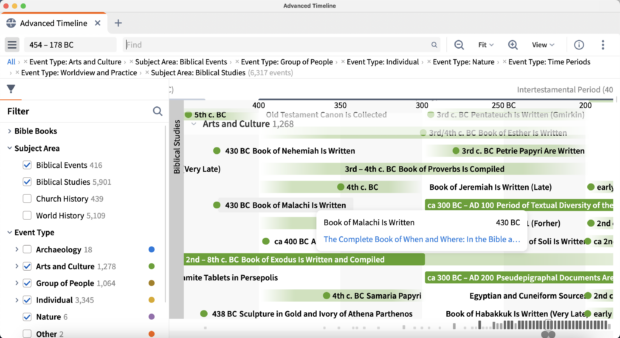
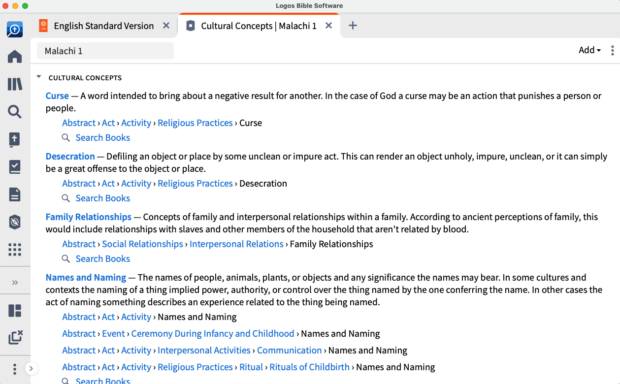
7. Literary context
Understand the role a passage plays in its whole book (and the whole Bible).
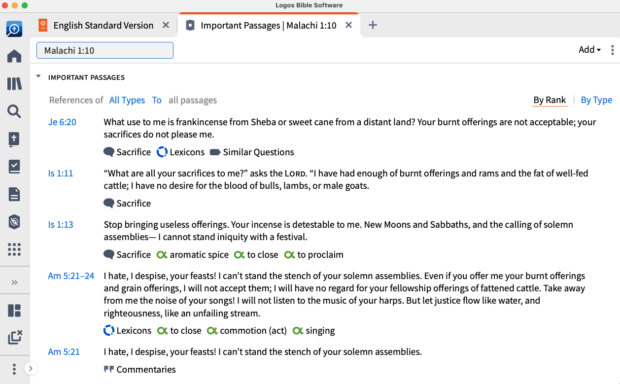
8. Word studies
Unpack key words, phrases, and concepts.10
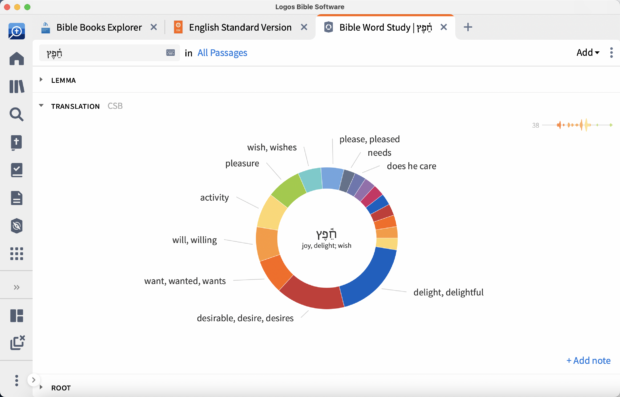
Then, because as D. A. Carson says “no exegesis exists in a vacuum,” you’ll by default move into one or several of the below interrelated theological disciplines:
Exegesis is unique compared to the above four disciplines—biblical, historical, systematic, and practical theology. But it also makes use of each.12
Each theology might impact a person’s exegesis (for example, a person will naturally bring their systematic theology into their interpretive process), but in the end, as Carson says, we must let Scripture have the final say.
Where to start doing exegesis
“The best way to master the Bible,” says Blackaby, “is just to start your study of it.”13 Don’t wait. Dig in.
Whether you are doing exegesis for personal edification or are writing a paper for seminary, we suggest starting with these ideas.
1. Tap into resources on exegesis
You can start by taking a Logos Mobile Ed course to learn more about biblical exegesis and how to do it, like Old and New Testament Exegesis.
Then, you might explore exegetical commentaries, which bridge the gap between critical commentaries and expositional commentaries. They typically go verse by verse through a passage—still including critical issues, but selectively. You’ll read original language observations, but typically exegetical commentaries move from observation to interpretation.14
Two solid commentary series are New International Commentary on the Old and New Testaments (NICOT/NICNT) or the Evangelical Exegetical Commentary (EEC)—or you can explore seven of the best ones here.
Since good exegesis involves analyzing a passage of any length—subject to the interest of the exegete (the person practicing exegesis)—in the biblical language of its original or earliest available form, Lexicons are another resource you’ll want by your side. A lexicon, writes Dr. Michael Heiser, is like a dictionary but arranged alphabetically by lemma (a basic form of the word) in the original language (Hebrew or Greek) with its basic English equivalent.15
The Greek-English Lexicon of the New Testament and Other Early Christian Literature (also known as BDAG) and Theological Lexicon of the Old and New Testaments are two respected options.
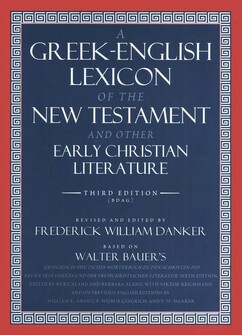
A Greek–English Lexicon of the New Testament and Other Early Christian Literature, 3rd ed. (BDAG)
Regular price: $149.99
Theological Lexicons of the Old and New Testament Collection (6 vols.)
Regular price: $119.99
Mobile Ed: LA171 Learn to Use Biblical Hebrew in Logos (12 hour course)
Regular price: $449.99
2. Use Bible software
One advantage to studying theology in the twenty-first century is the availability of digital Bible study tools to amplify your biblical research. Software like Logos allows you to not only search the full swath of Scripture in a few taps but add resources (like the ones I just mentioned) into a “digital library” for easy research. Plus, you’ll have several digital tools available to aid you in your Bible study.
For example, you don’t have to be an expert in Greek and Hebrew to interpret the Bible responsibly. With Logos, you can study a passage in its original language (even with a limited language background), find related verses, and even see how others interpret the passage in just a couple of clicks.
And best of all, you can lean on the Exegetical Guide in Logos (available in Starter & up), which makes exegesis a breeze. On top of being able to analyze the text in its original language, you can learn grammatical reasons for the way a text is translated, explore visual diagrams of the text, and more. (And you don’t have to be a scholar to use this Guide—many aids, like definitions and English Bible translations—help you along the way.)
Watch how it works:
Why do exegesis?
As Jason DeRouchie says, “Putting the Bible under a microscope should always result in us finding ourselves under its microscope.”16
Our goal in doing exegesis shouldn’t be about increasing biblical expertise but to have a personal encounter with God. Good exegesis should bring a deeper understanding of the broader story of the Bible that impacts our relationship with the One who is telling it.
That can only happen when we approach his word humbly, sift through Scripture responsibly, and depend on the Holy Spirit to make clear what we are studying.
Now, go forth—and exegete.
***
More resources on exegesis
Elements of Biblical Exegesis: A Basic Guide for Students and Ministers
Regular price: $24.99
Old Testament Exegesis: A Handbook for Students and Pastors, 5th ed.
Regular price: $15.99
Introducing New Testament Interpretation (Guides to New Testament Exegesis)
Regular price: $21.99
New International Dictionary of Old Testament Theology and Exegesis | NIDOTTE (5 vols.)
Regular price: $159.99
Toward an Exegetical Theology: Biblical Exegesis for Preaching and Teaching
Regular price: $27.99
Related articles
- Tattoo-Inspired New Testament Exegesis
- Crush Your Exegesis Paper: 3 Secrets Every Student Should Know
- What Do Lying Shrimp Have to Do with New Testament Exegesis?
Helpful links
Videos
- Exegetical Guide
- Mobile Exegetical Guide
- Exegetical Guide: Academic and Theologian Study Series
- Exegetical Guide; Advanced Bible Study Series
- Anchor Yale Bible Dictionary, “Exegesis” (Yale University Press, New Haven, CT), 1992.
- Anchor Yale Bible Dictionary, “Exegesis” (Yale University Press, New Haven, CT), 1992.
- D. Fee, Handbook to New Testament Exegesis (1993), 27.
- Naselli, Andy. New Testament Exegesis: Understanding and Applying the New Testament (Course), (Lexham Press, Bellingham, WA), 2016.
- Peter J. Leithart, Typological Hermeneutics: Finding Christ in the Whole Bible (Course) (Lexham Press, Bellingham, WA), 2016.
- https://www.faithgateway.com/exegesis-you-can-do-it/#.YG8hEBNKjOQ
- Walter C. Kaiser Jr., Toward an Exegetical Theology: Biblical Exegesis for Preaching and Teaching (Baker Publishing, 1998), 47.
- Cairns, Alan. Dictionary of Theological Terms, “Exegesis” (Ambassador Emerald International), 2002.
- https://www.spurgeon.org/resource-library/sermons/rightly-dividing-the-word-of-truth/#flipbook/
- Naselli, Andy. New Testament Exegesis: Understanding and Applying the New Testament (Course), (Lexham Press, Bellingham, WA), 2016.
- Naselli, Andy. New Testament Exegesis: Understanding and Applying the New Testament (Course), (Lexham Press, Bellingham, WA), 2016.
- Jason DeRouchie, Old Testament Exegesis: Understanding and Applying the Old Testament (Lexham Press, Bellingham, WA), 2016.
- https://www.faithgateway.com/exegesis-you-can-do-it/#.YG8hEBNKjOQ
- https://www.logos.com/grow/7-of-the-best-exegetical-bible-commentaries/
- Michael S. Heiser, Learn to Use Biblical Hebrew (Lexham Press, Bellingham, WA), 2020.
- Jason DeRouchie, Old Testament Exegesis: Understanding and Applying the Old Testament (Lexham Press, Bellingham, WA), 2016.










